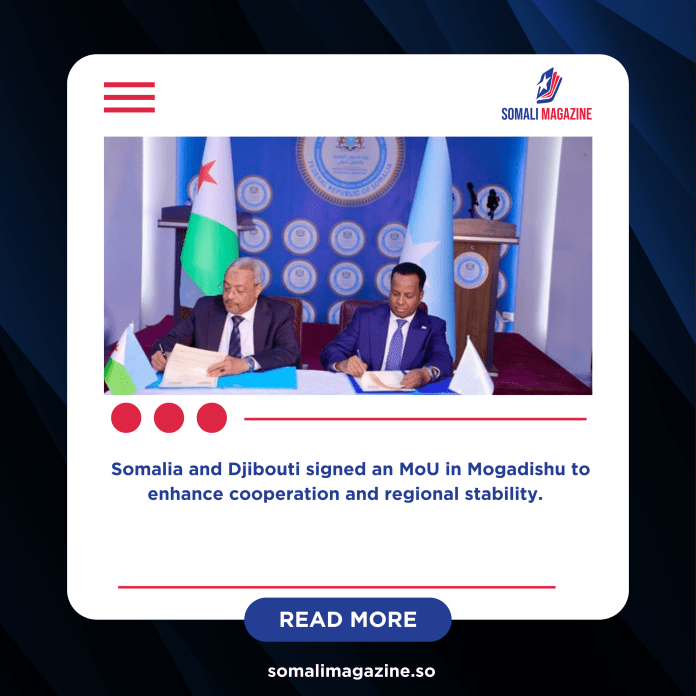Facebook Twitter (X) Instagram Somali Magazine - People's Magazine
Somalia and Djibouti have strengthened their close relationship by signing a Memorandum of Understanding (MoU) that establishes a formal system for regular political consultations between the two countries. The agreement was signed on Saturday in Mogadishu by Somalia’s Minister of Foreign Affairs and International Cooperation, Abdisalam Abdi Ali, and Djibouti’s Minister of Foreign Affairs, Ambassador Abdulqadir Hussein Omar.
The signing of this MoU is seen as a step forward in deepening the longstanding ties between the two nations. It creates a structured framework that allows both governments to hold consistent dialogues, exchange ideas, and align their positions on a wide range of issues. While it focuses primarily on strengthening bilateral relations, the agreement also aims to give both countries a stronger voice on regional and international matters.
Somalia and Djibouti have always shared deep historical, cultural, and social connections, with their partnership often shaped by common goals and mutual support. Both nations belong to the Horn of Africa, a region that has long faced instability, security threats, and economic challenges. By agreeing to hold regular consultations, Somalia and Djibouti hope to reinforce their collaboration and work more effectively to tackle shared concerns.
During the signing ceremony, the ministers emphasized the importance of enhancing diplomatic cooperation in order to achieve peace, stability, and prosperity. They noted that stronger ties between their countries would not only serve their own citizens but also contribute to the stability of the wider Horn of Africa. The new consultation mechanism is intended to help both governments maintain a consistent and constructive partnership instead of limiting engagement to occasional high-level meetings.

A major theme of the discussions was security. Somalia and Djibouti both play vital roles in peacebuilding and counterterrorism efforts in the region. Somalia continues to rebuild and stabilize after years of conflict, while Djibouti has positioned itself as a strategic hub for international military operations against terrorism and piracy, hosting several foreign military bases. Through closer coordination, the two governments believe they can strengthen their collective ability to confront security threats, safeguard their borders, and support peacekeeping missions. A more secure environment, they stressed, would open doors for greater economic cooperation, investment, and development projects that could benefit people across both countries.
Another important aspect of the MoU is cooperation in regional and global forums. Both Somalia and Djibouti are members of the Intergovernmental Authority on Development (IGAD) and the African Union, and they often have common interests in international organizations such as the United Nations. With the consultation framework in place, the two countries can align their diplomatic positions more effectively and advocate jointly on key issues, including climate change, humanitarian challenges, and trade opportunities.
Although the governments did not disclose detailed terms of the MoU, both ministers expressed optimism about the future of the partnership. Somalia’s Foreign Minister Abdisalam Abdi Ali described the agreement as a new chapter in the relationship between the two countries, built on trust, shared history, and mutual respect. His Djiboutian counterpart, Ambassador Abdulqadir Hussein Omar, said the pact reflects a common vision for peace, security, and prosperity, not only for their nations but for the entire Horn of Africa.
The agreement also builds on the long history of solidarity between Somalia and Djibouti. Their shared language, culture, and traditions have created a strong foundation for cooperation over the years, and both governments view the MoU as an extension of this deep friendship. It is not simply a diplomatic formality but a demonstration of their commitment to work hand in hand in addressing present and future challenges.
As the Horn of Africa continues to navigate political and economic uncertainties, the partnership between Somalia and Djibouti is expected to play a crucial role in shaping the region’s stability. The decision to hold regular consultations signals that both countries are looking beyond immediate challenges and are focused on building a lasting, structured, and forward-looking relationship. The signing of this agreement represents more than diplomatic progress—it is a shared belief that peace, development, and prosperity can only be achieved through dialogue, cooperation, and unity.

